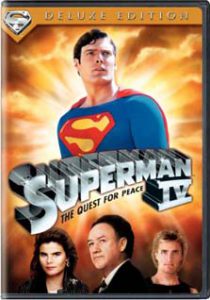In 1985’s “Rocky IV,” Rocky ends the Cold War with an impassioned speech. Two years later, “Superman IV: The Quest for Peace” (1987) offers a more sobering examination of the issue: By the movie’s end, the creation of nuclear bombs goes on, even though Superman (Christopher Reeve) has flung the existing arsenal into the sun. The latter is more grounded, but it’s not nearly as inspiring, which is why “Rocky IV” is a cult classic and “Superman IV” rates a 3.7 on IMDB.
Humor doesn’t land
Of course, if “Quest for Peace” was a better film overall, the fact that even Superman can’t save humanity unless we learn for ourselves could play as a stark, powerful ending. But, clocking in at a mere 90 minutes, this is one of those movies where it seems the filmmakers themselves want to get it over with.
Reeve is a co-writer, but the other lead filmmakers are new to the franchise: director Sidney J. Furie and co-writers Lawrence Konner and Mark Rosenthal. While I didn’t appreciate the decision to make “Superman III” more comedic, at least the humor often landed in that film. That’s not the case here.

“Superman IV: The Quest for Peace” (1987)
Director: Sidney J. Furie
Writers: Lawrence Konner, Mark Rosenthal (screenplay, story); Christopher Reeve (story)
Stars: Christopher Reeve, Gene Hackman, Margot Kidder
For example, John Cryer’s antics as a “Whoa, dude!” nephew of Lex Luthor (Gene Hackman) never land, yet he persists. At another point, Clark throws a heavy barbell at a weightlifter, and I cringed over the fact that he could’ve crushed the guy’s larynx.
Still-relevant themes
Thematically, “The Quest for Peace” has points of view that remain relevant. The Daily Planet has been taken over by magnate David Warfield (Sam Wanamaker), who favors sensationalist headlines that even editor-in-chief Perry White (Jackie Cooper) think go overboard. In today’s internet journalism, we see this reflected in click-bait.
And after the presidents of the USA and USSR – modeled after Reagan and Gorbachev – announce that summit talks have failed and they will be increasing their nuclear stockpiles – the film raises a good question: Can Superman end the arms race?
I like how the debate plays out in a grade-school classroom: Most of the kids are as cynical as the adults, scoffing at the notion that anything can be done. The idea that they should write a letter to their Congressperson is laughable even to grade schoolers (and this was back when Congress actually did vote on wars).
Ignoring the “How dare you be an idealist” stares from his classmates, Jeremy (Damian McLawhorn) suggests writing a letter to Superman. Here, the sensationalist Daily Planet inadvertently does some good, turning the kid into a media darling and inspiring Supes to think about intervening in the Cold War.
Although the film doesn’t really dig into his thought process, Superman used to cede to the checks and balances of Earth governments (owing to Jor-El’s teachings that he not meddle with human culture). He hopes that people will not vote against their best interests, but he cannot interfere when they do.

Humanity’s last hope
But in “Superman IV” – perhaps seeing how children are totally at the mercy of adult idiocy — he decides he needs to serve as the ultimate check on the global saber-rattling and war profiteering. Going before the U.N., he says he represents no nation, but every ambassador offers to sponsor him so he can speak. He declares that he’ll destroy all nuclear weapons, and the ambassadors applaud. The awkward positions of the USA and USSR ambassadors are not examined by the skin-deep script.
While Supes destroys a bunch of weapons, maintains the stalemate and sends war profiteer Luthor back to prison, he ultimately can only beg and plead with humans in a closing speech that shows he’s still an idealist at heart:
“There will be peace when the people of the world want it so badly that their governments will have no choice but to give it to them. I just wish you could all see the Earth the way that I see it. Because when you really look at it, it’s just one world.”
There’s an outline of a good yarn in “Superman IV,” but the execution is often nonsensical. The powerful nations continue to test their rockets, letting Supes gather up and destroy them; you’d think they would see what he’s doing after he intercepts the first launch.
When Superman fights Luthor’s super-henchman Nuclear Man (Mark Pillow), he could bury him on the dark side of the moon and be done with it, but instead he goes to unnecessary lengths like moving the whole moon in front of the sun. And he pauses to straighten the American flag on the moon, appeasing the nationalists in the audience and watering down the theme that nations are the problem, not the solution.
Potential for laughs
On paper, the most fun segment of “Superman IV” is when Superman and Clark get roped into a double date with Lois Lane (Margot Kidder) and Lacy Warfield (Mariel Hemingway), respectively. But it’s not staged or paced with much panache.
Furthermore, based on the end of “Superman III,” Lana should be in the Lacy role. No mention is made of why Lana is no longer working as a secretary at the Daily Planet. I haven’t watched much of “Smallville,” but if my memory of the WB commercials serves, that show finally brought the love triangle to the screen, two decades after this film.
Weirdly, Lois fails to (permanently) make the Superman-Clark connection throughout all four Reeve films. For a moment, I thought she realizes Clark is Supes in “Superman IV,” but it turns out his magic kiss fogs her memory.
This power was established in the theatrical version of “Superman II,” but it’s not in the Donner cut (which I watched), so it was jarring to me. Also, a recording of Superman’s bio-mom Lara (Susannah York) speaks to him about the second green module that oh-so-conveniently exists in the space pod; she was likewise introduced in the theatrical “Superman II” but not the Donner cut.
Spacey nonsense
Those continuity issues are somewhat understandable, but there’s a big WTF moment in the final battle. Nuclear Man flies Lacy into space to provoke Supes. (Why he targets Lacy specifically is unclear, although you can find the explanatory deleted scenes on the Blu-ray.) Supes rescues her, and she is just fine despite having been exposed to outer space.
Back in 1978’s “Superman,” there’s a certain “Well, that makes no sense” quality to Superman reversing the rotation of the Earth, but it’s played with enough conviction – and the overall movie is good enough – that we forgive it. Lacy surviving in space, by contrast, is an utter “Look, we just don’t care anymore” moment from the filmmakers.
At the end of Reeve’s four generally entertaining “Superman” films, I’m left with a sense that the filmmakers left too many stones unturned: Lois learning our hero’s secret identity and dealing with it, the Lois-Lana rivalry, more villains from the comics, and a more robust exploration of what humanity thinks of Superman and his role as an Earth citizen.
More “Superman” films come after this – and indeed, the current DC Extended Universe films dig into the latter theme — but there’s only one Reeve, so these four movies comprise an incomplete journey.

